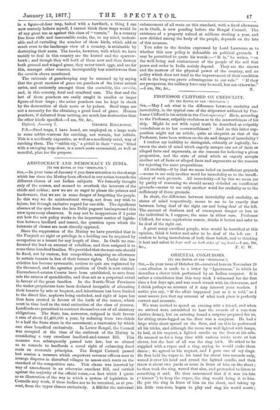PROFESSOR CLIFFORD ON CREDULITY.
[TO THE EDITOR OF THE "SPECTATOR."] SIR,—May I ask what is the difference betwe en credulity and incredulity, in the typical case of the shipowner adduced by Pro- fessor Clifford in his article in the Contemporary? He is, according to the Professor, culpably credulous as to the seaworthiness of his ship. Might he not with equal truth be described as culpably incredulous as to her unseaworthiness ? And on this latter sup- position might not an article, quite as eloquent as that of the Professor, have been written on the sin and danger of incredulity ?
I confess my inability to distinguish, ethically or logically, be- tween the state of mind which eagerly accepts one set of facts or alleged facts and arguments, as the reasons for believing a given proposition, and the state of mind which as eagerly accepts another set of facts or alleged facts and arguments as the reasons for rejecting the same propositions.
All credulity—if by that we mean belief on insufficient grounds —seems to me only another word for incredulity as to the insuffi- ciency of such grounds. All incredulity—if by this we mean (as by parity of reasoning we should mean) disbelief on insufficient grounds—seems to me only another word for credulity as to the sufficiency of those grounds.
In short, the difference between incredulity and credulity, as states of mind respectively, seems to me to be exactly that between being deaf of the right ear and being deaf of the left. The amount of deafness and of consequent danger or loss to the individual is, I suppose, the same in either case. Professor Clifford, for some mysterious reason, thinks it better and safer to be deaf of the right ear.
A great many excellent people, who would be horrified at this opinion, think it better and safer to be deaf of the left ear. I confess to being incredulous of both these beliefs, and to thinking it best and safest to hear well on both sides of my head.—I am, Sir,






































 Previous page
Previous page